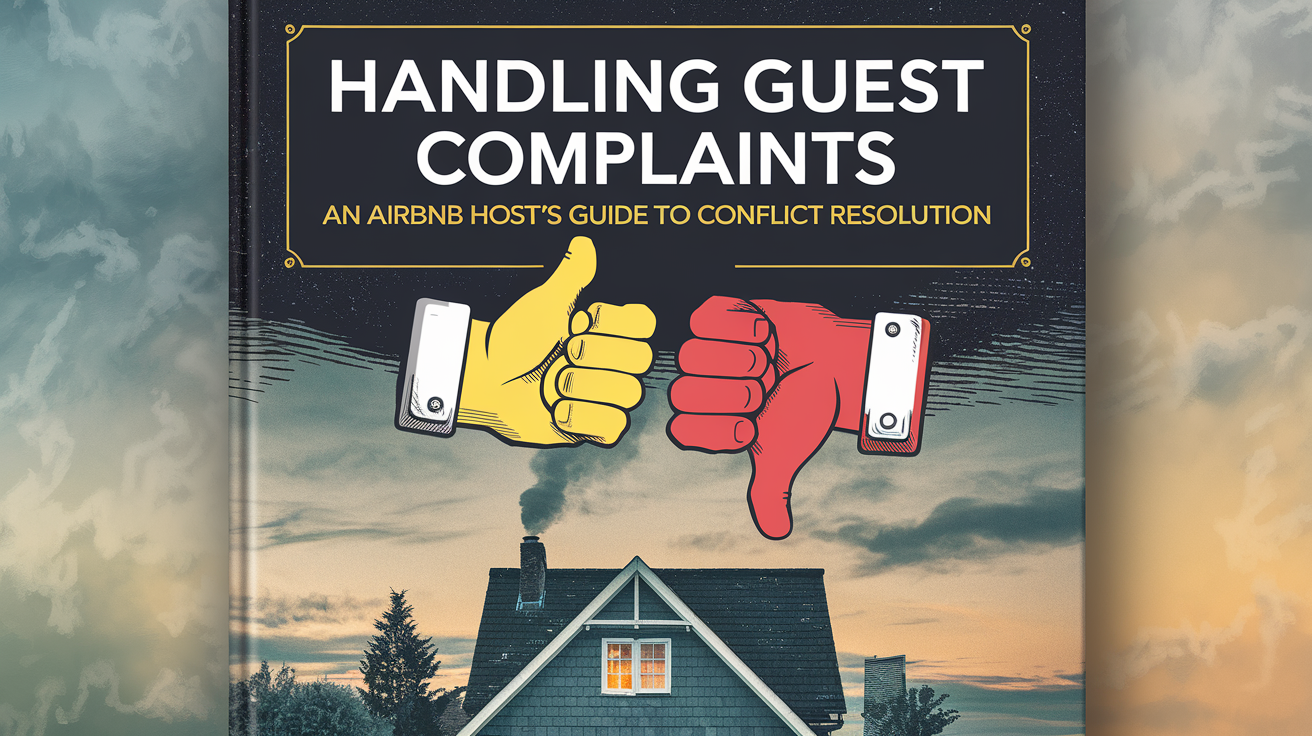

As an Airbnb host, managing guest satisfaction is a critical part of your success. Despite your best efforts, guest complaints are inevitable and handling them effectively can be the key to turning a potential negative experience into a positive one. Mastering the art of conflict resolution will not only enhance your guests’ experiences but also bolster your reputation as a thoughtful and responsive host.
This guide will equip Airbnb hosts with essential strategies for understanding, preventing, and resolving guest complaints, thereby ensuring every guest departs with a smile, and possibly, a glowing review. By embracing these techniques, hosts can create more enjoyable stays for their guests and smoother operations for themselves.
Understanding Common Guest Complaints
Handling guest complaints begins with understanding the issues that are most likely to arise. By recognizing common concerns, Airbnb hosts can prepare to address them swiftly and effectively, minimizing disruption to their guests’ experiences.
Some of the most frequent guest complaints include:
- Cleanliness Issues
A spotless rental is non-negotiable for most guests. Complaints about dirty bathrooms, unwashed linens, or dusty surfaces can quickly tarnish your listing’s reputation. Regular cleaning and periodic deep cleans are essential for maintaining high standards. - Amenities Not as Described
Guests often feel frustrated when promised amenities are missing or not functioning as expected, such as broken Wi-Fi, non-operational appliances, or a lack of kitchen essentials. Ensuring your property description is accurate and up-to-date can prevent these misunderstandings. - Noisy or Unsafe Environment
Noise complaints, whether from neighboring properties or busy streets, can ruin a guest’s stay. Similarly, safety concerns, such as poor lighting or faulty locks, can lead to negative feedback. Addressing these issues proactively can build guest trust. - Difficult Check-In or Check-Out Process
Complicated or delayed check-ins are a common source of frustration. Guests value a smooth, hassle-free process, so ensuring clear instructions and timely communication is key to avoiding problems. - Temperature and Comfort Concerns
Complaints about overly hot or cold interiors, uncomfortable furniture, or insufficient bedding often stem from overlooked comfort factors. Investing in climate control solutions and high-quality furnishings can make all the difference.
By understanding these common issues, you can anticipate your guests’ needs and reduce the likelihood of dissatisfaction. Remember, each complaint provides valuable insight into areas where you can improve and create a better experience for future guests.
Proactive Measures to Prevent Complaints
Preventing guest complaints starts well before a booking is made. Proactive measures such as clear communication, accurate listings, and regular maintenance not only reduce the chances of complaints but also enhance overall guest satisfaction. In fact, a study by Airbnb revealed that listings with accurate descriptions and professional photos receive 24% fewer complaints compared to those without.
1. Set Clear Expectations with Your Listing
A well-crafted listing is your first line of defense against misunderstandings. Ensure that:
- Descriptions are accurate: Avoid embellishments or vague statements. If your property has a small bathroom or is located near a busy street, disclose it upfront.
- Photos are up-to-date and high-quality: Listings with professional photos are 40% more likely to get booked and receive fewer disputes over misrepresented spaces.
2. Provide a Comprehensive House Manual
A detailed house manual can answer many common guest questions and reduce complaints about functionality or usability. Include:
- Wi-Fi details and troubleshooting tips.
- Instructions for appliances and amenities.
- House rules and check-in/check-out procedures.
- Emergency contact information.
3. Maintain Your Property Regularly
Routine maintenance prevents small issues from becoming big problems. A report from a vacation rental industry survey found that 55% of complaints related to property condition could have been avoided with regular upkeep. Schedule checks for:
- Plumbing and electrical systems.
- HVAC units and climate control.
- Kitchen appliances and smoke detectors.
4. Communicate Proactively
Guests appreciate hosts who are responsive and transparent. Studies show that hosts who respond to guest inquiries within an hour are more likely to achieve higher ratings. Before arrival, send a warm message with all necessary details, including check-in instructions, local tips, and answers to any questions.
5. Anticipate Guest Needs
Going the extra mile to anticipate guest expectations can reduce dissatisfaction. Provide essentials such as extra towels, toiletries, and basic pantry items. A survey by Booking.com found that 57% of travelers feel more welcome when hosts provide thoughtful touches like these.
By investing time and effort into these proactive measures, Airbnb hosts can significantly reduce the likelihood of guest complaints. Not only does this lead to smoother stays, but it also increases the likelihood of positive reviews, repeat bookings, and word-of-mouth referrals.
Effective Listening and Empathy in Responding to Complaints
When a guest raises a complaint, how you respond can make all the difference. Active listening and empathy are essential skills that demonstrate you value their concerns and are committed to resolving the issue. Addressing these concerns with tact and understanding not only diffuses tension but also builds trust and loyalty.
Why Is Active Listening So Important?
Active listening ensures guests feel heard, even if their concerns seem minor or unfounded. A survey by Zendesk found that 70% of customers associate their satisfaction with how well their concerns were addressed, emphasizing the importance of truly listening. Here’s how to practice active listening:
- Let the guest speak without interruption. This shows respect and allows you to gather all necessary details.
- Acknowledge their emotions. Use phrases like, “I understand how this could be frustrating.”
- Repeat or paraphrase their concerns. This ensures clarity and demonstrates you were paying attention.
How Can Hosts Show Empathy?
Empathy reassures guests that you care about their experience and are willing to help. Consider these examples of empathetic responses:
- For a cleanliness issue: “I’m so sorry the cleanliness didn’t meet your expectations. Let me arrange for immediate cleaning or offer a partial refund for the inconvenience.”
- For a missing amenity: “I completely understand how disappointing it must be not to have [specific amenity]. I’ll make this right by providing a solution as soon as possible.”
What If the Complaint Feels Unreasonable?
Sometimes, guests might raise issues you believe are exaggerated or outside your control. Even in these cases, responding respectfully is crucial. Instead of dismissing the complaint, try:
- Finding common ground: “I understand that this wasn’t what you expected. While I can’t change the [external factor, like noise], I’d like to help in any way I can.”
- Offering alternatives: Suggest ways to mitigate the inconvenience, such as providing a white noise machine for noise complaints or extending a late check-out for other disruptions.
How Quickly Should Hosts Respond?
Prompt communication is key. Airbnb’s guidelines recommend responding to guest concerns within 24 hours, but the sooner, the better. A quick response shows you prioritize their comfort and are actively working on a resolution. If immediate action isn’t possible, keep them updated on your progress to maintain trust.
What About Difficult or Aggressive Guests?
Handling an upset or aggressive guest requires extra patience. Stay calm, avoid escalating the situation, and focus on de-escalation techniques:
- Use a calm and polite tone, regardless of their demeanor.
- Apologize sincerely without admitting fault if the issue is unclear.
- If the guest becomes unreasonable, remind them of Airbnb’s policies and offer to involve Airbnb support for mediation.
By mastering active listening and empathetic communication, you can transform complaints into opportunities for growth. A well-handled complaint often leads to positive reviews and a stronger host-guest relationship, ensuring a more successful Airbnb experience for all.
Problem Solving and Offering Solutions
Addressing guest complaints isn’t just about listening—it’s about taking action. Effective problem-solving ensures that guests feel their concerns are not only acknowledged but resolved. The quicker and more thoughtfully you act, the more likely you are to turn a complaint into a positive review.
Step 1: Assess the Situation
Before jumping to a solution, gather all relevant details:
- Ask clarifying questions: Ensure you fully understand the complaint. For example, if a guest says the Wi-Fi isn’t working, ask if they’ve tried reconnecting or restarting their device.
- Evaluate urgency: Prioritize issues like safety concerns or plumbing failures over minor inconveniences.
Step 2: Offer Practical Solutions
Tailor your response to the complaint. Here are common scenarios and effective solutions:
- Cleanliness issues: Apologize and arrange for immediate cleaning. If that’s not possible, offer a partial refund or credit.
- Broken amenities: Provide a quick fix if possible, such as replacing a broken coffee maker. If repairs will take time, inform the guest and offer alternatives or compensation.
- Noise complaints: Suggest solutions like white noise machines or earplugs, and take steps to address the root cause, such as notifying neighbors about guest concerns.
Step 3: Involve Airbnb Support When Necessary
For disputes or complex situations, Airbnb’s Resolution Center can help mediate. Use this resource for:
- Resolving refund disputes.
- Mediating when guests make unreasonable demands.
- Documenting issues for insurance purposes.
Step 4: Follow Up
Once you’ve resolved the issue, follow up with the guest to ensure they’re satisfied. For instance, you might send a message saying, “I wanted to check in to see if the cleaning team addressed your concerns and if there’s anything else I can do to improve your stay.” This extra step shows you care about their experience.
By taking thoughtful action and providing timely solutions, you not only resolve the immediate issue but also build goodwill with your guests.
Learning from Complaints to Improve Hosting Practices
Guest complaints, while challenging, offer valuable insights for improving your hosting. By treating each issue as a learning opportunity, you can enhance your property and processes, ultimately leading to fewer complaints in the future.
1. Analyze Patterns in Feedback
Pay attention to recurring complaints in guest reviews or private feedback. For example:
- Do multiple guests mention uncomfortable bedding? It may be time to invest in higher-quality mattresses or linens.
- Have several guests reported difficulty with check-in? Review and streamline your check-in instructions or consider installing a smart lock.
2. Conduct Post-Stay Evaluations
After each booking, reflect on what went well and what could have been better:
- Did the guest mention any surprises or unmet expectations?
- Were there preventable issues that caused inconvenience?
By proactively evaluating your performance, you can identify areas for improvement.
3. Stay Updated on Industry Trends
Successful Airbnb hosts continuously educate themselves. Engage with resources like:
- Airbnb Host Community forums: Learn from other hosts’ experiences and solutions.
- Industry blogs or webinars: Stay informed about best practices, such as incorporating sustainable amenities or leveraging technology for better guest experiences.
4. Request Constructive Feedback
Encourage guests to share honest feedback privately. For example, include a note in your follow-up message: “Thank you for staying! If there’s anything we could improve for future guests, we’d love to hear your suggestions.”
5. Invest in Preventative Upgrades
Use complaints as a guide for property upgrades. For instance:
- If multiple guests mention dim lighting, consider adding brighter fixtures.
- If summer guests frequently complain about heat, installing air conditioning could be a worthwhile investment.
By learning from complaints and making incremental improvements, you can create a property that exceeds guest expectations. Not only will this lead to more positive reviews, but it will also position you as a proactive, guest-focused host.
By combining problem-solving strategies with a commitment to continuous improvement, Airbnb hosts can transform challenges into opportunities for growth. These practices ensure smoother operations, happier guests, and long-term success in the competitive vacation rental market.
Conclusion
Handling guest complaints effectively is a vital skill for every Airbnb host. By understanding common issues, taking proactive measures to prevent complaints, responding with empathy, and providing timely solutions, you can turn potentially negative experiences into opportunities to build trust and satisfaction. Additionally, using guest feedback as a tool for continuous improvement ensures your property evolves to meet the highest standards, resulting in happier guests and better reviews.
Remember, every complaint is an opportunity to learn and grow as a host. When handled thoughtfully, even challenging situations can leave guests with a positive impression of your hospitality.
Ready to elevate your hosting game? Start by reviewing your current practices, updating your property listing, and implementing these conflict resolution strategies. A little preparation goes a long way in ensuring every guest enjoys a memorable, hassle-free stay.









































































